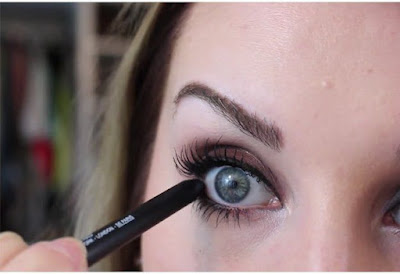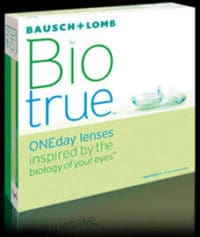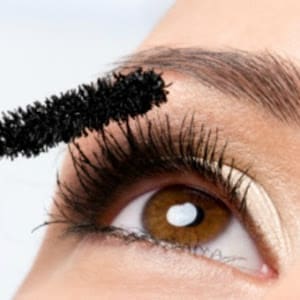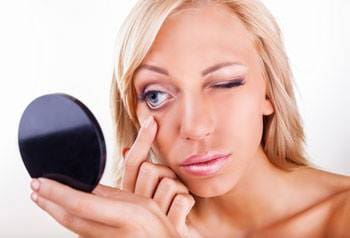COSMETICS CAN PERMANENTLY CHANGE THE FIT, FEEL, AND VISION OF YOUR CONTACT LENSES
Have you ever had the experience of leaving the eye doctor’s office with a great contact lens – excellent comfort and perfect vision – only to have the vision and comfort take a marked turn for the worse a few days or weeks later?
As Optometrists, we’ve seen this issue present itself many times. The lenses perform and move beautifully on the eye in the office, but a few days later, we’ll get a phone call from the patient that they need to be seen because their lenses “don’t fit.” What changed?
The Cosmetics-Contact Lens Connection
New research shows that the products we use around our eyes, from makeup to face wash and makeup remover, can cause significant changes to both the physical shape and performance of contact lenses. For many, that finishing touch to the daily beauty routine is a quick swipe of mascara, a dash of eyeliner, and/or a glossy pout. However, the cosmetics you use to enhance your look could affect your vision significantly. It can especially change the fit, feel, and vision of your contacts.
What about Creamy Products?
Cream-based eyeshadows or concealers give a richer color payoff, but they may also leave a film-like residue on contact lenses. The creamy nature of these cosmetics means they’re more likely to trap under the lenses and harbor bacteria, causing blurred vision, eye infections, and a less comfortable lens-wearing experience. The dense consistency of these products also makes them harder to remove, thus increasing contamination risks. This makes it vital not only to clean your lenses thoroughly but also to ensure your products are stored correctly and replaced regularly.
The Dilemma of Lipsticks
Lipsticks are a staple in several makeup bags. But could your favorite shade of red, pink, or nude be causing issues with your contact lenses? “How can a lipstick affect my contact lenses?” many would wonder. While it’s unlikely for lipstick to come in contact with your lenses directly, some of its ingredients can become airborne and settle on the lens surface. This is especially true for long-wear and matte formulas. So, next time you think, “It is just lipstick,” remember that airborne particles can carry certain dyes, fragrances, and other irritants to your contacts and subsequently affect your eyes.
What Face Wash Can Do to Your Contact Lens?
A study was performed looking more specifically at the changes these makeup and skincare products can have on the physical size, shape, and optical properties of a contact lens, and guess what? Statistically significant contact lens changes were found in the diameter (or size) of the lenses, base curve (or shape), and power (or prescription) of the lenses in this study. The degree of change relative to the baseline measurements was compared with the ISO standards for contact lenses, which suggests tolerance limits of +/-0.20 mm for lens diameter, +/-0.20 mm for base curve, and +/-0.25 D for lens power. NOT. GOOD. And NO. LONGER. WHAT. THE. DOCTOR. PRESCRIBED.
How Does Makeup or Makeup Removers Come in Contact With Your Contact Lenses?

It’s common to occasionally get makeup in your eyes, whether from a slip of the hand or tears of laughter causing mascara to run. What many do not realize is that certain makeup can easily adhere to contact lenses, affecting their overall performance and longevity.
Makeup applied to the waterline can easily transfer onto your contact lenses. The waterline is where our tear glands (called Meibomian glands) sit, so every time you blink, these glands release oils that spread over the surface of the eye, transferring any makeup applied to the area with them.
You may be surprised to know that contact lenses can be affected by your normal skincare products because they typically don’t come into contact with each other directly. No one rinses their contact lenses with makeup remover or coats them with mascara purposefully (or if you do, you’d expect them to be extremely uncomfortable as a result).
The overwhelming majority of the time, contact lenses are exposed to makeup and soaps by accident when you are either inserting or removing your contact lens. Sometimes, makeup or face wash residue is still on our hands when we touch our lenses, or if you are wearing your contact lenses when you apply eye makeup like mascara or eyeliner, small amounts of it can easily transfer into your eye and stick to the surface of the contact lens. The majority of monthly and biweekly disposable contact lenses are made from materials called silicone hydrogel, and the silicone in these lenses that helps make the contact lens more breathable is also very attracted to oils. Makeup and makeup removers are primarily oil-based products, and once they come into contact with a contact lens, they bind tightly and are next to impossible to remove, even with the strongest contact lens cleaners.
What Makeup And Face wash Can Do to Your Contact Lens
Makeup removers are essential in the beauty regimen of many people. The primary purpose of makeup removers is to effectively cleanse makeup, dirt, and sebum. However, some of these products can pose challenges, especially for those who wear contact lenses.
Not all skincare items are formulated with the delicate eye area in mind. Alcohol or fragrances in removers can adhere to the lenses, causing prolonged discomfort. Inappropriate or harsh makeup removers can lead to dryness, eye irritation, itching, and redness. Using makeup-removing wipes, for instance, with extreme force can lead to corneal abrasions, light sensitivity, and pain. Research shows these products primarily affect the fit of the contact lens by changing the base curve and diameter.

|
| Contact lens edge distortion caused by exposure of samfilcon A lens to Neutrogena Oil-Free Makeup Remover via |
Always be gentle when using makeup removers. Opt for ophthalmologist-tested products. In case of any irritation or discomfort, rinse the eyes immediately with cool water. If you suspect an allergic reaction, discontinue using the product and consult with a healthcare professional.
What Problems Do Mascaras Cause?
These products primarily affect image quality and vision by leaving deposits on the contact lenses that are almost impossible to remove, therefore changing the base curve; lens movement and centration of the contact lens on the eye could be affected.
Mascaras have fiber particles that can easily get trapped beneath the contact lens, leading to discomfort and potential scratches on the eye’s surface. Similarly, waterproof eyeliner, when applied to the waterline, can transfer to the lens. This not only causes blurred vision but can also alter the fit of your lens.
What About Face Washes?
Often, face washes may contain fragrances, preservatives, surfactants, and exfoliants that may be unsuitable for the eyes. For contact lens wearers, traces of face wash can adhere to the lenses, causing discomfort and potential contamination. You must be cautious when using face washes and avoid direct eye contact. Rinse thoroughly if any product reaches the eyes.
So — this is what we think — during the normal course of wear, contact lenses can be exposed to numerous facial and cosmetic products that can significantly impact the comfort and visual performance of the lens. Properly cleaning your contact lenses may help recover some of the parameter changes caused by different cosmetics to some degree. However, particularly mascara may still affect image quality and liquid eye makeup removers may affect lens fit.
Try This Hack!
To best prevent makeup from sticking to your contact lens and causing blurry vision, redness, or build-up on the lens, try this technique:
- Apply all of your makeup
- Wash your hands thoroughly
- Instill a rewetting drop to rinse makeup particles off your eye
- Insert your contact lens
By applying your makeup first and then using an artificial tear drop to rinse stray makeup particles away from the eye’s surface, it’s less likely that you’ll inadvertently transfer makeup onto the contact lens.
 |
Tips for Makeup and Contact Lens Safety
If you wear contact lenses, you must be aware of the impact your makeup choices can have. If you are struggling with contact lens performance, changing to a daily disposable contact lens and limiting exposure of the lens to cosmetic products may greatly increase lens comfort, vision, and wearing time. Avoiding waterproof mascaras and tightlining with eyeliner can also help minimize contact lens contamination.
The best solution? Changing to daily disposable lenses can make sure that your contact lenses perform the same every day!
Your Eyes Require Special Care.
While the charm of cosmetics and their beauty can be captivating, the safety and health of your eyes should always be a priority. The next time you pick up that mascara wand, harsh cleanser, or eyeliner pencil, take a moment to consider the potential impact on your contact lenses. By making informed choices and following safety precautions, you can enjoy the best of both worlds: stunning eyes and comfortable vision. If you experience issues, Schedule an Eye Exam Today. With proper care, awareness, and regular eye checkups, you can ensure that your vision remains crystal clear and your eyes stay healthy.










